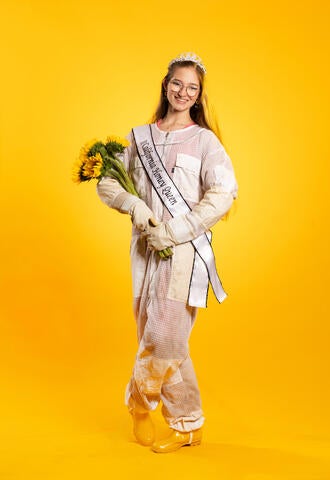Following a competitive process, the American Beekeeping Federation has crowned UCR entomology graduate student Emilia Burnham the 2024 California Honey Queen spokesperson.
(Stan Lim/UCR)
Burnham’s reign as queen will be defined by outreach to K – 12 youth groups, schools, and community programs about honeybee-related topics. These topics include how crops are pollinated, how dependent agriculture is on honeybees, and how to help keep bees healthy.
“I want to promote the science behind honeybees and teach others about their fascinating societies,” Burnham said.
At UCR, Burnham studies Nosema ceranae, a harmful honeybee fungal pathogen which causes Nosemosis, also known as Nosema disease. Infection of adult bees at a young age can cause the bee to have difficulty digesting food and a shortened lifespan. When queen bees are infected, they can cease laying eggs.
In the last 20 years, dramatic declines in honeybee populations have been reported throughout the world, putting food security at risk. Nosema disease is one of several factors responsible for the decline.
Burnham is part of a team at UCR’s Center for Integrative Bee Research aiming to develop new treatments for Nosema and other threats to bee colonies, including repelling bees from crops treated with toxic insecticides.
As she educates Californians about bees, she wants them to know that there are two aspects to honeybee immunity — innate, genetic immunity, and social forms of immunity. “How bees organize their hives and the way they groom themselves, as well as each other, helps them defend against different pathogens,” Burnham said.
Finally, California’s new honey queen wants people to know that there are actions they can take to help endangered native bees, and that taking these actions also helps honeybees. “Native bees can help support honeybee populations. With more and diverse native bees providing pollination services, the burden on managed bees can be lessened and may help decrease competition between honeybees and native bees,” she said.
One such action people can take is planting sunflowers, and other native plants. The pollen from these plants helps support the immune systems of honeybees as well as native bees. It has also been found to help them defend against internal pathogens, such as Nosema ceranae and Crithidia bombi.
Having attained this position, Burnham is now eligible to compete for the American Beekeeping Federation’s national title of American Honey Queen spokesperson. She will travel to Reno, Nevada in January for the competition.
